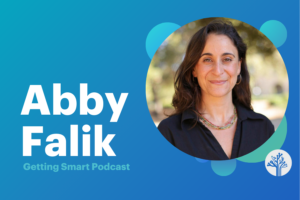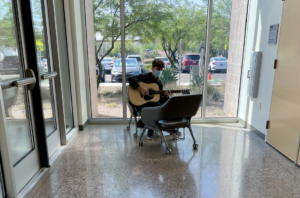Three Schools On Three Paths to Personalized Learning Success

By Dr. Mary Ann Wolf and Alex Dreier
As children head back to school, administrators and educators are focused on helping each student lay the foundation for a successful year. Many are exploring different ways to personalize learning and use digital tools to support and drive this personalization.
Part of our mission at the Friday Institute is to help empower and enable schools to begin or continue on their journeys towards personalizing learning for each of their students. This approach will never be generic or one-size-fits-all, nor should anything in education. We have seen time and time again how a personalized learning approach can help students maximize their potential.
Charlotte-Mecklenburg Schools (CMS) in North Carolina has had the opportunity to set out on a personalized learning (PL) journey all its own. The district has included schools from diverse backgrounds and challenges, and in the process has discovered that a grassroots approach – grown organically and organized from the bottom up – can provide the best opportunity to achieve success. The Friday Institute was fortunate to visit and explore three of these schools in greater depth.
Grand Oak Elementary School, Ridge Road Middle School and Newell Elementary School are three of 15 schools in CMS that began their PL initiatives three years ago (i.e., this year that number has increased to over 60 of the district’s schools).
Each of these three schools has created its own unique vision, finding successes and challenges along the way as they seek to fulfill this vision. While the schools are different in many ways, they each share common goals when it comes to personalizing learning for their students: they meet students where they are, guide them towards fulfilling their potential, and impart a sense of ownership of learning and efficacy in the process.
Grand Oak Elementary School

Grand Oak Elementary School began its PL journey in 2013 as part of the first cohort of the CMS Personalized Learning Initiative. Principal Ray Giovanelli chose to guide the entire school into PL at once but wanted to make sure that teachers began where they felt most comfortable in the process.
He has focused on professional learning from the beginning, providing his teachers with reflection time on a monthly basis and offering support in their daily work. “Our teachers have really pushed the envelope,” he states with evident pride. “They’ve done so by taking ownership of their own learning and supporting their colleagues as they experience the transition to personalized learning together.”
Teacher Jennifer Brinn points out that the school’s tagline, “Collaborate, Innovate, Achieve” isn’t just for the students, but includes all the stakeholders involved. “PL has opened the door for more reflective practice as educators.”
Ridge Road Middle School

Ridge Road Middle School completed its third year of PL in 2017. When asked for a definition of PL, Tiffany Bartram, a seventh-grade ELA teacher, said, “Nobody can answer that. It’s differentiation on steroids. It’s meeting the students where they are.”
While not all teachers have embraced PL at Ridge Road, social studies teacher Kendall Pauling, noted that “more than half the teachers use it for at least some small things.” For Pauling, PL has made her planning more intentional. She uses data at the beginning, middle and end of the learning process, monitoring student progress along the way.
Adjustments are made throughout, relooping if necessary, and students go at their own pace. A culture shift has also been evident to all in the school as PL has taken root. Teachers have become more comfortable with the idea of failure as part of the growth process.
Bartram observes, “We’re here to problem solve and learn from our mistakes. We use our tools to figure out what went wrong and what to try the next time. These are good lessons for the kids to learn.”
Newell Elementary School

Newell Elementary School began its transition to PL as part of the first cohort of CMS PL schools. Natalie Matthews, a K/1 teacher and a 2016 Change Agent Fellow for CMS PL4, says the transition to PL from traditional teaching was scary at first, but once she learned more about it, “[PL] made so much more sense. It’s what we should have been doing all along.”
Kimberly Parker, a kindergarten teacher, was hesitant to jump into PL, and she relied heavily on her teammates for planning and taking the lead. She found that starting small—picking one area to start with—was helpful in making the transition. “It’s true that here might be a lot of work upfront in order to create materials, structurescand routines, but after the initial work is complete, PL is a more efficient way to teach.”
Parker underscores how collaboration is at the core of any successful PL initiative, saying, “The only way for PL to be successful is for people to work together.”
Watch teachers from the three schools describe how they got started with PL:
While each of these schools has unique contexts, students, communities, administrators and teachers, several themes emerged across all of the schools we visited. The themes included:
- Shared culture;
- Professional learning;
- Student-centered and student-driven teaching and learning; and
- Whole child and social and emotional learning (SEL).
CMS students and teachers who have made the transition to PL don’t want to return to a traditional classroom model of learning. Teachers find they get to know their students better and collaborate with other teachers and administrators in ways that are challenging and encouraging their own learning. Students and teachers feel more engaged and more confident.
According to Emma, a student at Ridge Road Middle School, PL just “lets you do you.” Kaelin, another student at Ridge Road Middle School, advises teachers to use a PL approach to “get to know [their] students” to help them connect on a personal level. The more teachers and students get to know each other, the more they trust one another. That trust lays the foundation for learning to flourish.
The schools also shared key recommendations for schools looking to transition to personalized learning. These recommendations included:
- Provide purposeful leadership and support from the district level;
- Consider and respect the complexity of PL;
- Invest in human capacity;
- Lead with culture, trust and agency; and
- Ensure learning is at the core.
All of these recommendations and more about the journey can be found in the newly released case study Personalizing the Paths to Personalized Learning: Meeting Students and Teachers Where They Are.
For more, see:
- What Do Students Really Think About Teaching and Learning?
- 4 Ways a Charlotte-Mecklenburg School is Making Learning Personal
- Silicon Schools Reflects on Five Years of Personalized Learning
Dr. Mary Ann Wolf is director of digital learning programs at the Friday Institute. Follow her on Twitter: @maryannwolfed
Alex Dreier is the Instructional Design Lead at the Friday Institute. Follow him on Twitter: @AlexDreier
Stay in-the-know with all things EdTech and innovations in learning by signing up to receive the weekly Smart Update.





John V. Wood
Why didn't you reach out to Research Triangle High School in Durham? They're completely flipped, and are on the third year of the Personalized Learning Platform - created by Summit Public Schools in California. That could have been a good interview for you, and they're a lot closer than Charlotte.
Replies
Erik Day
Thanks for the suggestion John! It can be tough to keep track of every cool school out there, but we'll definitely keep Research Triangle High School in mind in the future.